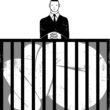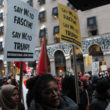Prosecuting Obama?
If they can do this to me, they can do it to President Obama and anyone who ever made a campaign contribution to him and then was appointed ambassador.—Former Alabama Governor Don Siegelman
ENRON STOCK WAS a prudent investment and Jack Abramoff was an A-List Washington lobbyist when criminal investigators set out to build a case against Alabama Governor Donald E. Siegelman. Most accounts of the campaign to jail Don Siegelman begin with President George W. Bush’s appointment of Alabama’s two U.S. attorneys in 2001. But there was a prelude to the federal prosecution, and it began in 1999 in the office of Alabama Attorney General William Pryor. Since then, Siegelman and a cast of codefendants have twice been put on trial in two federal courts. The result was one conviction, which was upheld by a federal court of appeals and denied review by the Supreme Court. At the end of June, a Supreme Court ruling on an Enron-related case provided Siegelman one final opportunity to reargue his conviction in a federal court of appeals.
Prosecutors started not with Siegelman but with one of his political supporters, Phillip Bobo. “The Bobo case started in 1999, five months after Don Siegelman was elected,” said Doug Jones in an interview. At the time Jones was an assistant United States attorney in the Middle District of Alabama.
Phillip Bobo was a Tuscaloosa physician who had made a $23,000 political contribution to Siegelman’s campaign. Prosecutors in the Alabama attorney general’s office were trying to make a “pay-to-play” case that would link Bobo to Siegelman.
To be precise, one prosecutor was pursuing Don Siegelman. That prosecutor was Matthew Hart, who as an assistant attorney general secured a conviction of Bobo for Medicaid fraud in the fall of 2001. The conviction was overturned on appeal, but while it was on appeal, Hart was named an assistant U.S. attorney in the Northern District of Alabama, in Birmingham.
Jones said that from its inception the Siegelman investigation was driven by a political agenda. After leaving the U.S. attorney’s office in Montgomery, Jones worked as a defense attorney on one of Siegelman’s criminal cases. While he was still an assistant U.S. attorney and Hart was an assistant state attorney general, Hart approached Jones’s office while conducting a corruption investigation. “Matt told one of my criminal chiefs that he hoped Siegelman was involved,” Jones said.
Siegelman was aware of the political nature of his prosecution. “The prosecutor said ‘we hope this will lead to a corruption case against Governor Siegelman,'” Siegelman told me. “There were no witnesses, no evidence, no paper trail. They were starting an investigation and hoping it would lead to me.” It did.
George W. Bush moved quickly to fill the U.S. attorney positions in Alabama in 2001. Alice Martin was named USA for the Northern District, where Hart landed as her assistant. Leura Canary was appointed to the Middle District, in Montgomery. (Canary’s husband, Bill, had managed the 1998 reelection campaign of Republican Attorney General William Pryor, with help from George W. Bush’s political mentor Karl Rove.)
With two Republican U.S. attorneys in place, Hart resumed his criminal investigation of Siegelman. At the same time, Bill Canary directed the 2002 gubernatorial campaign of Republican Bob Riley, then a U.S. Congressman, who defeated Siegelman when a midnight re-tabulation of votes in one Alabama county shifted 6,000 votes from Siegelman to Riley. Attorney General Pryor overruled a recount request and sealed the ballots. The following year, George W. Bush appointed Pryor to the 11th Circuit Court of Appeals.
In 2004, Hart indicted Siegelman, Bobo, and Siegelman’s former chief of staff Paul Hamrick for attempting to rig Medicare bids. At a pre-trial hearing, the judge cited Hart for contempt for filing documents that could inflame the opinion of the jury. The prosecution folded on the first day of the trial, after the judge excluded additional evidence that was essential to their case. As the judge was ruling on the prosecution’s evidence, the Birmingham News reported that another investigation of Siegelman was underway.
“In all my years practicing law and working as an assistant U.S. attorney I have never seen anything like this,” Jones said. “Whenever there was what appeared to be a dry hole for the government, they would go on to another one. … They kept casting their net wider and wider.”
TRY, TRY AGAIN—In October 2005, exactly one year after the first federal case against him unraveled in court, Siegelman was indicted again, on new charges of bribery, conspiracy, and honest services fraud. The heart of the government’s case this time was an allegation that Siegelman accepted $500,000 from HealthSouth CEO Richard Scrushy in exchange for a seat on a statewide medical board.
In June 2006, Siegelman was convicted of seven of 25 counts filed against him, including honest services fraud, and sentenced to seven years in prison. Judge Mark Fuller denied Siegelman the standard 45 days before reporting to a correctional facility and had him escorted from the courtroom in manacles and leg irons.
Fuller had been a district attorney before he was appointed to the federal bench and his successor, who was appointed by Siegelman, reported accounting irregularities that had occurred while Fuller was in office. So perhaps the leg irons and manacles were a grace note. Siegelman served nine months in prison and was only released on bail after an appeals court overruled Fuller’s denial of bond.
Siegelman’s protracted prosecution in Alabama has always appeared to be part of a much broader campaign. Siegelman insists that “Karl Rove’s fingerprints” were all over his prosecution. Rove was subpoenaed, and testified before the House Judiciary Committee in 2009, artfully denying any involvement or knowledge of Siegelman’s prosecution. And he recently addressed the issue in his political autobiography, Courage and Consequence: “I had nothing — zip, zero, nada — to do with the Siegelman prosecution. Like other Americans, I learned about it while reading the morning paper.” Of course.
Even if you remove Rove as deus ex machina from the Siegelman narrative, it has been evident for a while that something is rotten in Alabama.
SAVED BY JEFF SKILLING—The prolonged prosecution of Don Siegelman has been covered; most thoroughly by Scott Horton, a Columbia University law professor who writes for Harper’s Magazine. It has also been written about in the Atlantic, on the online sites Raw Story and Talking Points Memo, and in these pages (“Did Karl Rove Help Send an Innocent Man to Prison?” Washington SpectatorNovember 15, 2007).
Yet nowhere have I read that Siegelman might find vindication in a Supreme Court ruling on the Enron case.
The high court’s June 29 decision vacating some of the charges that sent Enron CEO Jeffrey Skilling to prison was accompanied by an order that remanded Siegelman’s conviction back to the 11th Circuit Court of Appeals.
Siegelman, a lawyer, told me that he was not surprised that the Supreme Court linked his case with Skilling’s. “When you hear some of the oral arguments,” Siegelman said, “by Justice Scalia for example, it is pretty clear that some strong voices on the court feel that the honest services fraud statute was unconstitutionally vague and should be stricken.”
Siegelman’s conviction (and the conviction of Richard Scrushy) pivots on the $500,000 political contribution that Scrushy made to retire some of the debt incurred by a non-profit foundation Siegelman had set up to promote a statewide lottery to raise money for public education.
The prosecution alleged that in return for the contribution, Siegelman appointed Scrushy to a board that controlled permits for medical facilities. No testimony or document established that Siegelman offered Scrushy a seat on the board in exchange for the contribution. Federal bribery statutes allow jurors to infer that such a deal was made.
There are other questionable aspects of the case. Scrushy had served on the same board under three previous governors. And the conviction rested on the testimony of a former aide to Siegelman, who had been convicted of selling political favors and was cooperating with the government in an effort to shave some time off his sentence. Federal prosecutors visited the aide more than 70 times in prison in an effort to nail down his testimony, according to the TV news program 60 Minutes. The prosecutors also required him to write and rewrite his testimony, to get his story straight.
But those are facts. The Supreme Court is weighing issues of law. In his petition to the Supreme Court, Siegelman’s appellate attorney Sam Heldman wrote that the judge instructed jurors to convict based on “the mere conclusion that Governor Siegelman ‘intended’ to ‘act as a result of campaign contributions.'” (Solicitor General Elena Kagan filed a brief for the Obama administration, arguing that the Supreme Court should not hear the Siegelman case.)
In an interview, Heldman, who is working on the legal argument he will make before the court of appeals, focused on the need for clarity in criminal law.
“I believe the Eleventh Circuit can and should reverse all Governor Siegelman’s convictions underSkilling,” Heldman said, “because the Supreme Court emphasized what is fundamental in our system of law, which is that criminal laws must be written clearly, to give notice of what they prohibit. And those laws must not be stretched on a case-by-case basis to try to cover things beyond their intent.”
Scott Horton, who has taken up the Siegelman case as a personal cause, has written that he believes the 11th Circuit Court of Appeals will overturn Siegelman’s conviction. Doug Jones, who has been an impassioned critic of the process that convicted Siegelman, believes Siegelman faces “an uphill climb.”
Jones said Siegelman’s attorneys did all they could to convince the judge that the prosecution was political. But it is difficult to convince a judge that a prosecution of an elected official is political, because the indictment and prosecution of any elected official can be described as political. Yet Siegelman’s prosecution appeared to be a part of a coordinated assault on a popular Democrat who had been elected to the offices of attorney general, lieutenant governor, and governor in a Republican state.
In 2001, every political apparatchik in the national Republican Party must have bought a plane ticket to Montgomery. Siegelman reminded me that Jack Abramoff, who would be convicted of stealing millions from his lobbying clients, spent millions of dollars trying to defeat him. Abramoff also funded a stealth campaign to defeat Siegelman’s lottery initiative, which represented a threat to Abramoff’s Indian gaming clients in Mississippi.
Abramoff’s factotum, Michael Scanlon, who would also go to prison, was another contributor to the effort to kill the lottery. Ralph Reed, who once directed the Christian Coalition and was working as a political consultant, was Abramoff’s front man and religious cover. An Alabama attorney testified that Karl Rove was also involved in the case. And a report by the House Judiciary Committee places Rove in the Don Siegelman narrative despite Rove’s denials.
BUSH’S LEGACY AT DOJ—As it turns out, one of the most polarizing U.S. attorneys appointed during the Bush administration’s campaign to fill the offices with loyal partisans is still in office in the Middle District of Alabama. Leura Canary is closing in on 10 years as United States attorney in Montgomery.
Doug Jones said the Obama administration has a policy of keeping USAs in place until their replacements are confirmed by the Senate. The result is that of the 93 U.S. attorneys, only 57 have been confirmed. Fifteen candidates are still before the Senate Judiciary Committee, 16 are still in the vetting process, and five have yet to be appointed.
The policy is a high-minded reaction to the previous administration’s purges of U.S. attorneys who shied away from partisan prosecutions. Republican Senators have used it to ensure that the front lines of the Justice Department are manned by Bush appointees.
Staffing the U.S. attorneys’ offices is most challenging in states represented by two Republican senators, such as Alabama, where Senators Richard Shelby and Jeff Sessions have each blocked one of the two candidates appointed to replace Canary. (Sessions sits on the Judiciary Committee and once served as a United States attorney.)
In Texas, all four U.S. attorneys are Bush administration holdovers. U.S. attorneys’ offices in Arkansas and Mississippi are still staffed by Bush administration appointees.
When I spoke with Jones, he was at a meeting with the Department of Justice in Washington, discussing the urgency of getting the administration’s U.S. attorneys in place.
Karl Rove is working with American Crossroads, a campaign group that plans to spend $50 million in the 2010 elections.
Richard Scrushy is in a federal prison in Beaumont, Texas.
Matthew Hart is still an assistant USA in Birmingham, and would not comment on the role he played in the prosecution of the former Alabama governor.
Don Siegelman is out on bail after what he describes as a “diesel road trip” to federal prisons in New York, Oklahoma, and Louisiana.
I sent Siegelman a follow-up e-mail asking him how much his legal defense has cost him thus far.
He responded: “Over 2½ million in legal fees … not counting loss of income … pain to my wife and children … you get the idea.”
HONEST SERVICES FRAUD?—The idea behind “honest services fraud” is that a felony can be committed by a party who denies someone his “intangible” right to “honest services.” According the analysis of Lyle Denniston, a veteran journalist covering the courts at Scotusblog.com, courts have struggled to determine what kind of wrongdoing fits the concept the statute defines.
Matching the crime to the concept is such a challenge, as Sam Heldman wrote in Siegelman’s petition to the Supreme Court, that what is defined as honest services fraud in one federal judicial circuit is not a fraud in several others.
Not only do district courts of appeal struggle with the concept. The Supreme Court couldn’t get on the same page in the Skilling decision. Six justices found the pattern of the lower court rulings clear and definite. And three justices described the rulings as inconsistent.
But a majority of the court held that extending the scope of the law beyond bribes and kickbacks leaves the door open for prosecutions when the law provides no clear warning of what behavior is prohibited.
Skilling was charged with depriving Enron shareholders of the honest services due to them by engaging in wire fraud that affected the value of Enron stock.
Siegelman was charged with mail fraud in which he and Richard Scrushy conspired to deprive the citizens of Alabama of the intangible honest services they should have received.






0 Comments